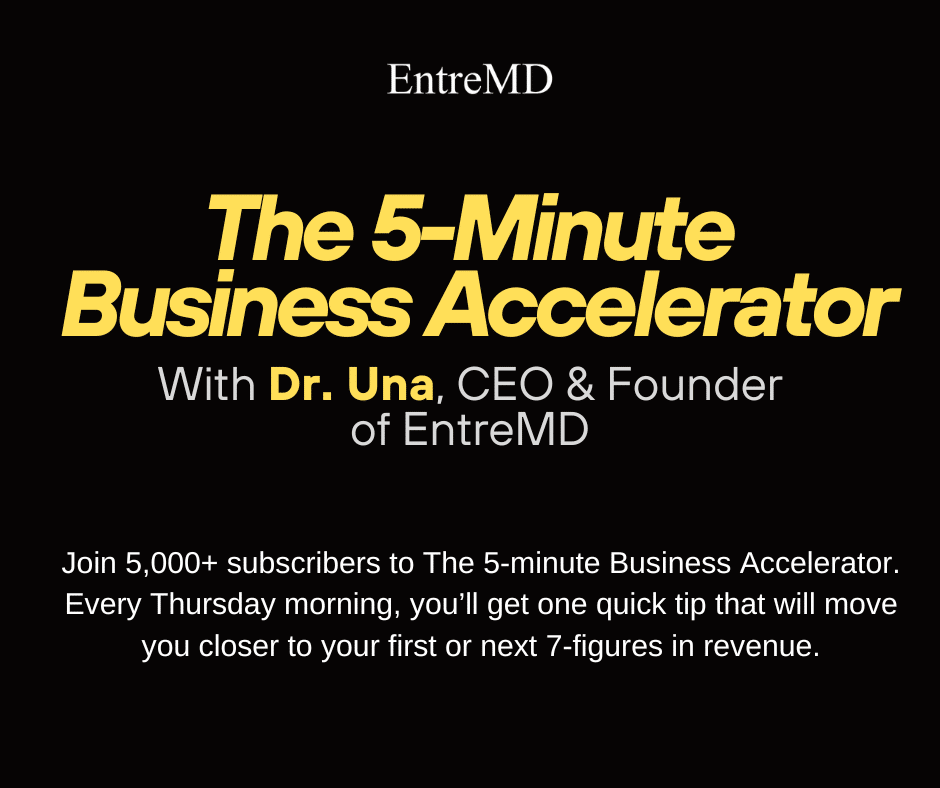John Mattone, one of the world’s top executive coaches and leadership speakers, writes that a keynote speaker “sets the pitch for a seminar, convention, or technical meeting–similar to how the oboe (the instrument least affected by ambient conditions) sets the pitch for tuning an orchestra.”
He says that excellent keynote speakers will have “the ability to enthrall their audience with their mellifluous speaking and sound stories.” Speaking mellifluously was probably not a trait and talent any of us thought might be handy to have when we were working through medical school and our residency program!
But now that many of us have years of work and life experience under our belts, taking that expertise and turning it into a side hustle is a great way to become an entrepreneurial MD. And if you think you just might have what it takes to set the tone at an event, I’ve researched everything you’ll need to know about becoming a great keynote speaker.
Of course, keynote speakers are at the top of the game regarding public speaking. No one starts at that level. But if you have a natural aptitude and love of speaking publicly, you may grow to be an in-demand speaker and find yourself delivering the message your client hopes to get across at their event.
What Makes a Good Keynote Speaker?
Let’s start with what makes a good speaker before we get to what makes a good keynote speaker.
You shouldn’t struggle with glossophobia. Glossophobia is the fear of public speaking; fully 75% of the population struggle with it. More people are afraid of talking in public than they are afraid of heights, bugs, snakes, drowning, or claustrophobia.
While it’s punishing on the speaker with glossophobia, it can be excruciating to be in the audience and watch someone who is clearly uncomfortable delivering their message.
It’s not impossible to overcome a fear of public speaking, but the best public speakers are those who are clearly comfortable facing a room full of strangers. More than just comfortable, great speakers look like there’s no place they would rather be.
They make eye contact with everyone in the crowd. They’re comfortable with small silences and can easily wait while the crowd laughs at something funny before carrying on with the speech.
When asked what the most important elements of any speech are, John Kennedy’s speechwriter, Ted Sorenson, said, “‘Brevity, levity, and charity.’ He believed that if you can make people laugh, you have an unfair advantage over speakers who can’t.”

Great speakers have a personality their audience can connect with. No matter the speech material, a speaker who conveys realness and passion is more likely to convince others of their point of view. Or at least challenge others’ preconceived notions and get them to rethink.
When it comes to becoming a great keynote speaker, you’ll need more than just talent. The job of a keynote speaker isn’t just to entertain and engage. They are a company’s or organization’s representative and are hired to deliver a talk that sets the stage for the rest of the speakers who follow.
While there are skills you can cultivate that will qualify you to become a sought-after keynote speaker, there are some skills you can’t simply learn.
Most keynote speakers have a unique level of expertise that lets them speak with authority and credibility. They’re positioned as an expert in their field and deliver their speech with specific flair and personality.
Most keynote speakers already have a high level of visibility in their industry. It’s rare to attend a big event and for a keynote speaker to be someone no one has heard of. If you’ve been living under a rock and the speaker’s name isn’t recognizable, once they’ve been introduced and you hear their credentials, you’ll realize you should have heard of them.
What Makes a Good Keynote Speech?
Above all, keynote speeches are expected to be inspirational. Inspiring speeches communicate the message that you can be better, do better and get better than you currently are. They are filled with hope and optimism while still staying grounded in reality.
Tell stories. Great keynote speeches build people up through stories. Stories may be the speaker’s personal experience or the compelling experiences of other people. People lean in and give you 100% of their attention whenever you start to tell a story.
And when the story triggers emotions, people can influence how well they remember. Research shows that “when people get emotional, the amygdala in their brain is stimulated, and their bodies often secrete adrenaline.” Apparently, the stimulation and adrenaline work on the hippocampus, which is the center of memory function.

Make them laugh. While the topic of health and health care is serious, weaving humor throughout a speech is one of the best ways to keep an audience engaged and connected. We all know that boredom is the enemy of engagement, but its antidote is humor.
Laughter makes the heart rate go up, which in turn keeps people stimulated and alert. It also improves memory and cognitive function. But the humor in a good keynote speech isn’t about channeling your inner stand-up comedian and telling jokes.
It’s the humor we find in the absurdities of our common human experience. No matter the topic of a keynote speech, there will be ways to relate a little humor to the speech. Some of the best and most engaged laughs come when the speaker uses sincere and self-deprecating humor by telling stories about themselves.
10 Places to Apply as a Physician/Healthcare Keynote Speaker
So now you’ve read this far, let me give you what I promised at the beginning — 10 places to apply as a physician/healthcare keynote speaker:
1. Forum for Healthcare Strategists
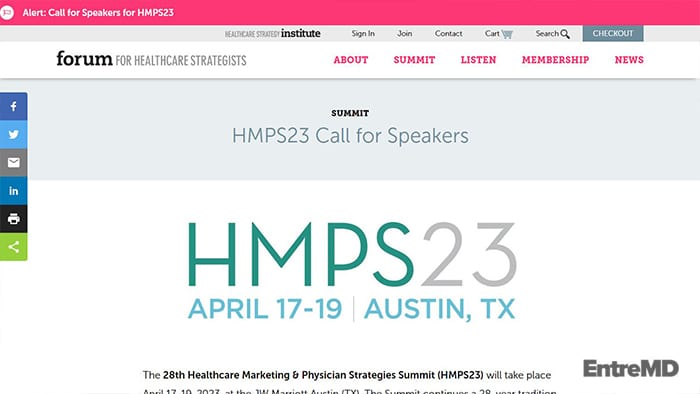
The Forum has posted a call for speakers for their 28th Healthcare Marketing & Physician Strategies Summit in April of next year. They’re “looking for advanced strategies targeted to a senior-level audience of marketers, communicators, digital strategists, and physician relations executives.”
2. Innovative Healthcare Speakers
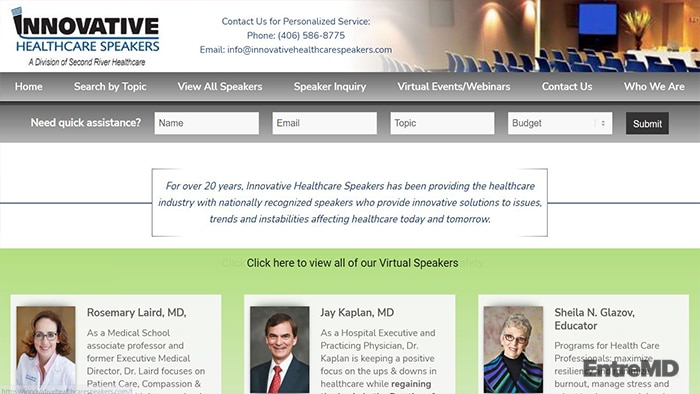
Innovative Healthcare Speakers has a large roster of speakers from every facet of healthcare. They thoroughly screen speakers by reviewing their materials, watching demo tapes, and checking references. Event organizers contact them with their event topic, budget, audience type, and expectations.
3. GDA Speakers
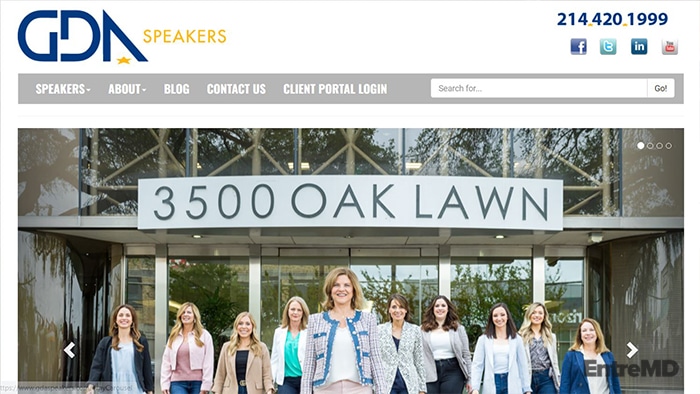
GDA Speakers carry an extensive line of available speakers in every field, including healthcare. They currently have 37 healthcare-related speakers, six of which are physicians. Each speaker profile includes a short bio, videos of previous speeches, articles written, and feedback and testimonials. The profile also lists how many keynotes the speaker has done, along with books written and available videos.
4. Executive Speakers

Executive Speaker’s goal is to “represent the most innovative speakers who want to share their passion and creativity to make a difference in the world.” Their site currently has 2,316 keynote speakers listed by industry, including 87 mental health and health and wellness speakers.
5. BigSpeak Speakers Bureau
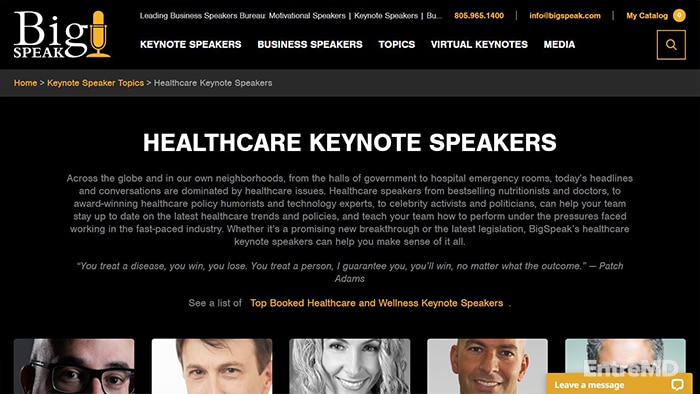
BigSpeak Speakers Bureau calls itself a “full-spectrum business speakers bureau.” They have speakers from every industry — from Accountability to Zappos Business Speakers, including health and wellness and healthcare. They allow their speakers to be contacted directly or through their site, where the speaker will pay them a commission for arranging bookings.
6. Eagles Talent
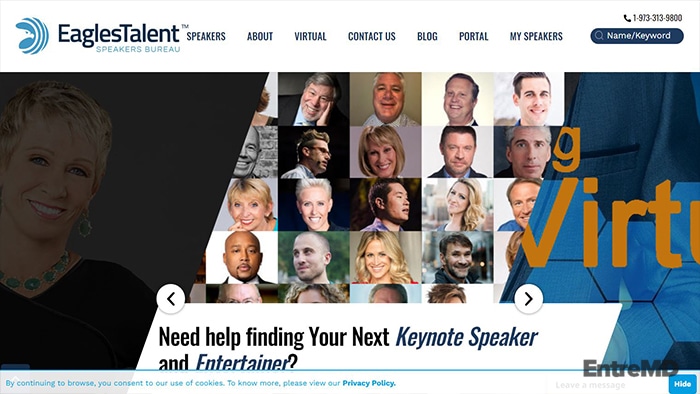
Eagles Talent has been around since 1979 and is a founding member of IASB (International Association of Speakers Bureaus). They help organizations looking for keynote speakers through their three-step process: Needs Analysis, Selection Process, and Follow-Through. Their speakers are listed by topic, with 10 subtopics shown under Healthcare.
7. All American Entertainment (AAE)
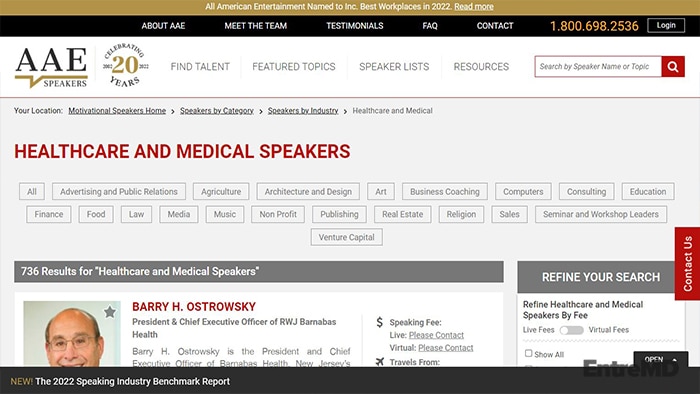
AAE currently has 736 speakers on their Healthcare and Medical Speakers List. Many of these are MDs, while others’ credentials range from being authors, economists, futurists, and business backgrounds. Nancy Snyderman, well-known for her work as an award-winning medical journalist working for ABC and NBC News, is one of their speakers.
8. National Speakers Bureau (NSB)
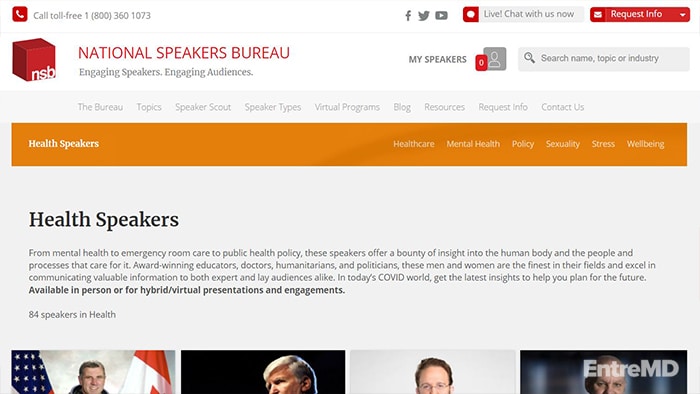
NSB currently has 84 health speakers who speak on topics from mental health to emergency room care to public health policy. Eight of these are MDs, while the other 76 speaker’s experiences range from a retired Lieutenant Colonel/mental health innovator (Stephane Grenier) to the former frontman for The Guess Who (Carl Dixon) to a former Chair of the Mental Health Commission of Canada (David Goldbloom).
9. Leading Authorities, Inc
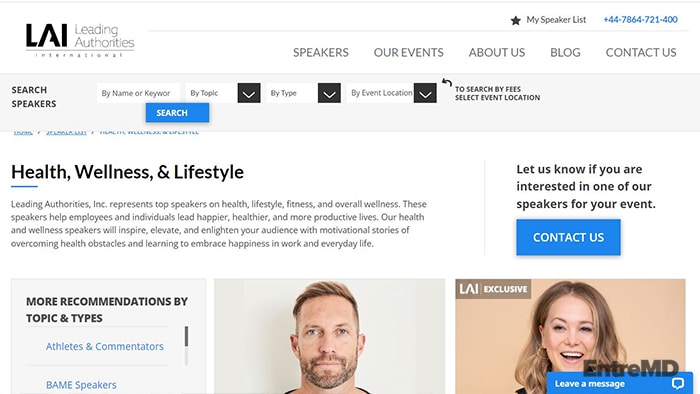
LAI Speakers organize their speakers by topic, including healthcare. Their 59 healthcare speakers are all highly regarded, and most have recognizable names and/or reputations. They ask interested speakers to email them at speakerinfo@lauthorities.com and include a biography, speech topics with descriptions, video footage of recent speaking, speaking fee and travel requirements, any additional speaking materials, and a list of speaking engagements in the past year.
10. Keynote Speakers
Keynote Speakers is possibly the most prestigious company on this list. Their speaker roster includes Oprah Winfrey, Richard Branson, Tony Robbins, and many other A-name celebrities. With access to over 5,000 speakers, they also have a robust list of healthcare speakers.
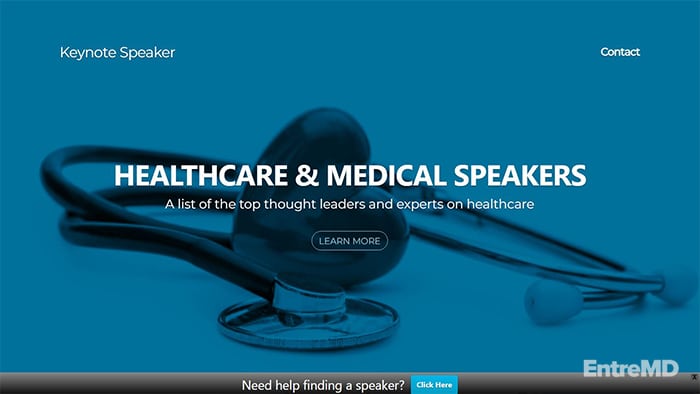
They invite people interested in becoming professionals and paid keynote speakers to contact them. This site also includes blog posts filled with everything you could want to know about the world of keynote speaking.
Examples of Inspiring Keynote Speakers
Sometimes the best way to learn how to become great at something is to watch masters doing what they do best.
What do all these speeches have in common? You get the sense that each one of these speakers wants to connect with you. They’re not there to inflate who they are, but rather, as you listen, you are convinced they have your interests in mind.
They generously share insights, lessons, and new takeaways they’ve discovered. When you listen to a great keynote speaker, you think (and feel) that you’re being entertained, educated, and inspired. You’re not thinking about how much the speaker is being paid.

As I was working on this blog post, I found an excellent article that analyzed the first keynote speech example on the list below. But Benjie Bruce does more than analyze this incredible speech. He goes on to crack the code on what makes speeches great.
Speaking of Sir Ken Robinson’s TedTalk, he says, “The entire presentation is ‘framing’ the audience…setting up the audience…for the one moment, the one idea, the one thing the speaker wants to communicate (at the end).”
And you’ll see this happen in all the speech examples here:
Sir Ken Robinson: “Do Schools Kill Creativity?”
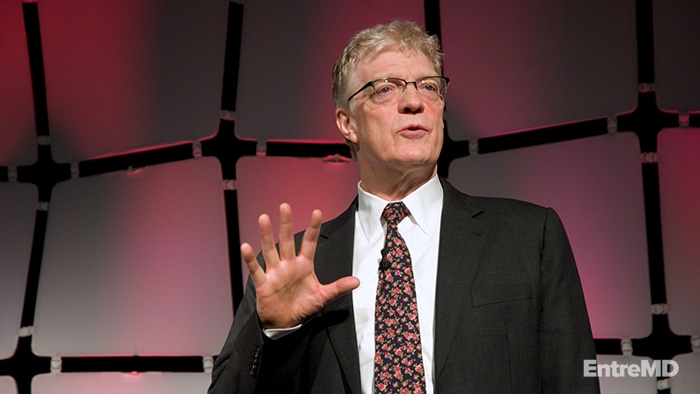
Image from Tim Wilson | Flickr
This speech changed the lives of millions of people. It’s been viewed online over 60 million times. About his speech-making style, Sir Ken Robinson told an interviewer, “If they’re laughing, they’re listening.”
Steve Jobs: “introducing the iPhone”
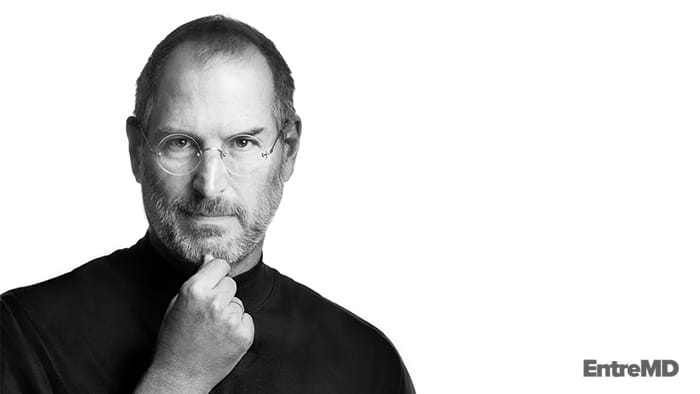
He co-founded Apple Computers and was an inventor, designer, and entrepreneur. Steve Jobs made speeches with passion and could communicate simply and memorably. He used stories and demonstrations, focusing on one idea at a time. You can watch his “introducing the iPhone” speech right here.
Marc Randolph: “Disruption and Turning Ideas into Reality”
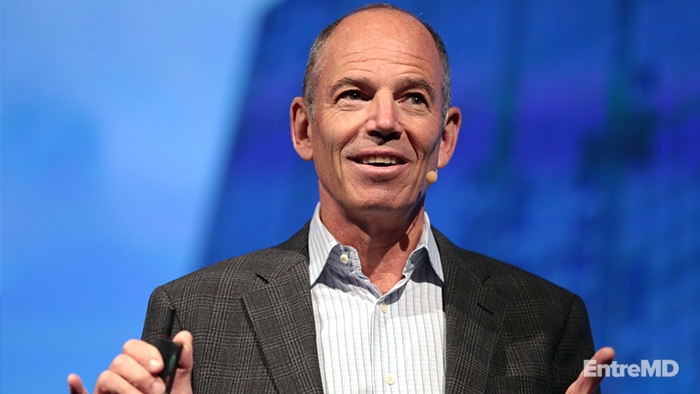
Image from Gage Skidmore | Flickr
The first CEO and co-founder of Netflix, Marc Randolph, tells stories from his life that can be applied to business principles. He’s logical, down-to-earth, and entertaining, and his speeches motivate the audience to think differently.
Barack Obama: “2004 Democratic National Convention”
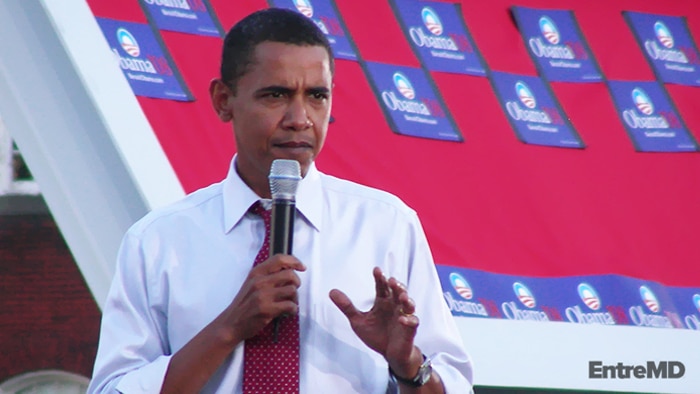
Image from jamesomalley | Flickr
President Obama has been recognized as one of the best speakers of all time. He may not have written the speeches, but his delivery had people trust him. His speeches used the Rule of Three technique. You can watch his “2004 Democratic National Convention” speech over here.
Gary Vaynerchuk: “NAC New Jersey”
Although most keynote speeches seem to last between 45-60 minutes, Gary Vaynerchuk can hold his audience’s attention for over an hour. His delivery style is extremely passionate, with lots of arm-waving. If you watch more than one of his speeches, you’ll notice he has one core message: Do what you love. You can find Gary’s speech over here.
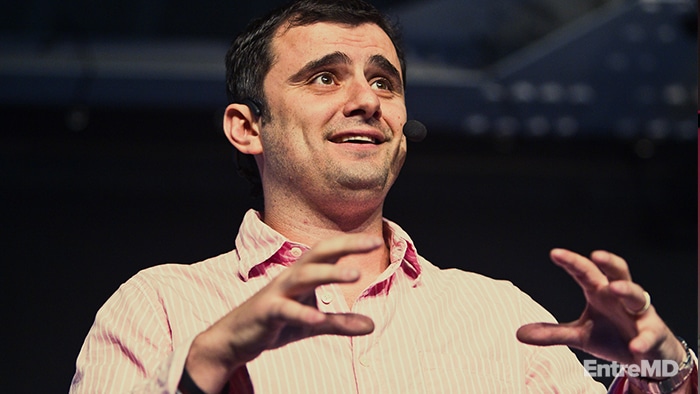
Image from Silicon Prairie News | Flickr
Warning: Gary can’t speak without using profanity to get his point across.
James Clear “Atomic Habits”
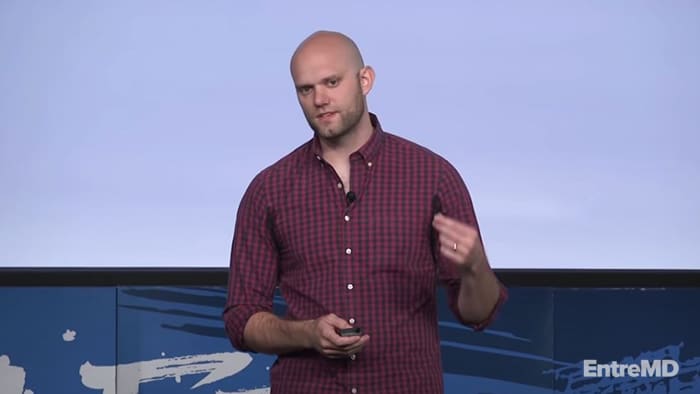
James Clear has a reputation for “distilling complex topics into simple behaviors that can be easily applied to daily life and work.” He’s the author of “Atomic Habits,” which applies his expertise in biology, psychology, and neuroscience to habit making. You can find his “Atomic Habits” speech here.
Simon Sinek: “How Great Leaders Inspire Action”
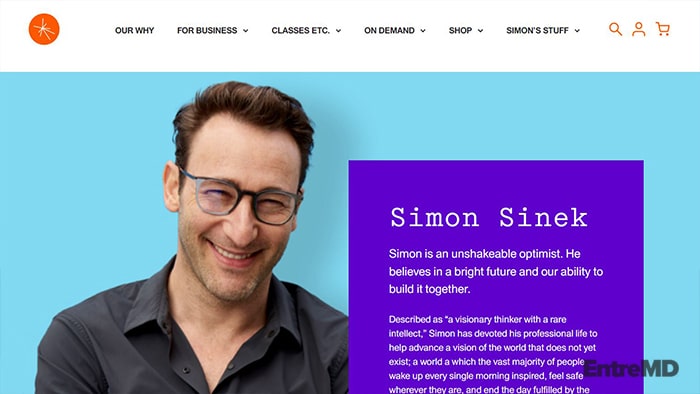
One of the best examples of how body language enhances speech delivery, Simon Sinek makes consistent and direct eye contact with his audience. He also uses big and small gestures and varies the tone of his voice when he’s trying to be persuasive or motivational.
Kelly McGonigal: “How to Make Stress Your Friend”
With over 20 million views, Kelly McGonigal’s TED Global talk in 2013 is one of their most popular. She pulls her audience in by being vulnerable with her audience and asking them engaging questions.
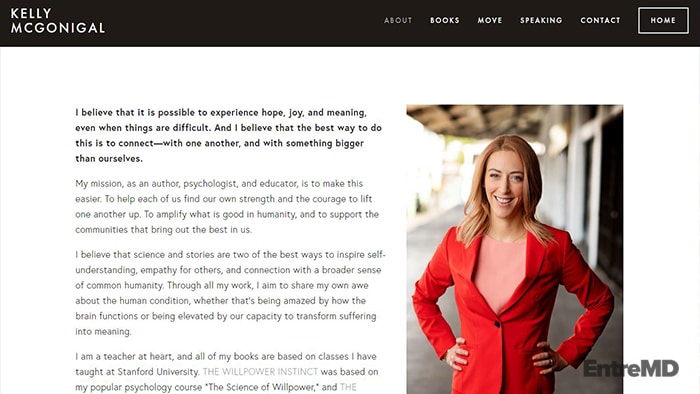
While the world of becoming a keynote speaker may seem intimidating and overwhelming, if you have a message to communicate, are passionate about your message, and enjoy standing in front of a crowd of people, you may have what it takes to be a great one.
There’s nothing quite like the thrill of talking about your passion and carrying an audience with you through a journey. When they’re inspired, moved, and laugh by your message, you’ll find incredible satisfaction in living out your purpose.

